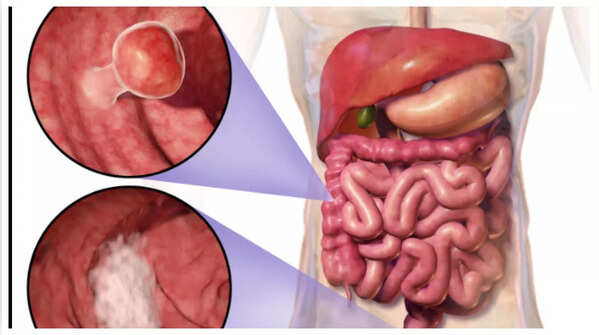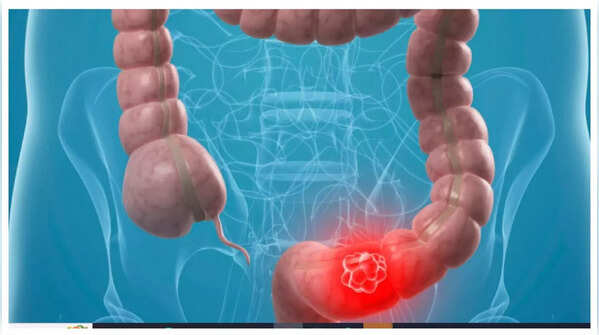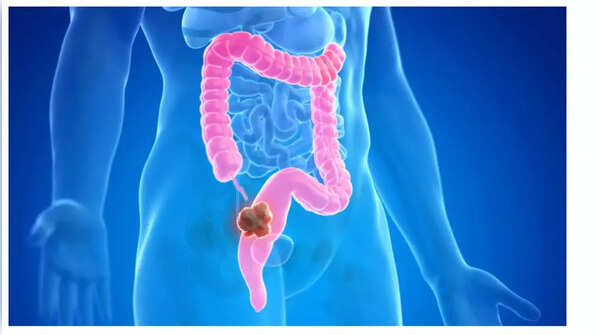Colon cancer, also known as colorectal cancer, is a condition that arises in the colon or rectum, the final section of the large intestine. It frequently starts as benign clumps of cells called polyps, which can evolve into cancerous growths over time. While most cases of colon cancer appear without evident pre-existing risks, elements like family history, obesity, and lifestyle choices can elevate an individual's susceptibility. Often, colon cancer manifests after the age of 50, with initial symptoms being subtle and easily mistaken for common digestive problems or stomach infections. Nevertheless, certain warning signs should not be overlooked.

A significant early indicator of colon cancer is a noticeable shift in bowel habits. These changes may present as:
These alterations may seem insignificant or transient, often attributed to dietary factors, stress, or minor infections. However, the persistence or recurrence of these bowel changes over several days could signal the presence of colon cancer. Such persistent changes might indicate that a growing tumor is affecting the colon, thereby disrupting normal bowel movements.

The presence of blood in stool should always warrant attention, regardless of whether colon cancer is suspected. This symptom can manifest as:
In some instances, the bleeding may be minimal, undetectable to the naked eye, but can lead to anemia over time. While blood in the stool can stem from various conditions like hemorrhoids or infections, it is essential to rule out colon cancer, particularly if the symptom is recurrent or accompanied by other signs.

Persistent abdominal discomfort represents another early symptom frequently dismissed by individuals. This discomfort may encompass:
Such discomfort might be mistaken for indigestion or other minor digestive issues like constipation. However, if the pain is continuous and unrelated to dietary or lifestyle changes, it could signify a tumor causing irritation or blockage within the colon.

Experiencing unusual tiredness or weakness without an apparent cause can be a subtle indication of colon cancer, especially when combined with other symptoms. This occurs because slow, unnoticed bleeding within the colon can result in iron deficiency anemia. When the body lacks sufficient red blood cells, its capacity to transport oxygen is compromised, leading to fatigue, shortness of breath, and weakness. While these symptoms may be attributed to stress or insufficient sleep, a thorough evaluation is still advisable.

Unexplained weight loss is a frequent symptom observed in many cancers, including colon cancer. When the body is actively combating cancer, the immune system remains in a heightened state, and tumors can disrupt digestion and appetite. If you experience significant weight loss despite maintaining consistent dietary and exercise habits, seeking medical advice is crucial. Although this symptom typically manifests later in the disease, it can occasionally serve as an early warning sign.

Maintaining a well-balanced and nutritious diet is crucial for overall health.

It is imperative not to dismiss any of the aforementioned symptoms.

A cancer diagnosis has a profound mental impact, often triggering intense emotions. Initial shock and disbelief are common as individuals grapple with the life-altering news and the uncertainty of their future.

If you experience any of these symptoms, consult a doctor promptly and avoid waiting for the symptoms to worsen.

Regular exercise can help prevent numerous ailments, including cancer.

Make sure you do not ignore these symptoms

Consult a doctor

Do not ignore these signs

Identify the symptoms before its too late

Disclaimer: This article serves informational purposes only and should not substitute professional medical advice. Always seek guidance from a qualified healthcare provider if you experience any of the issues mentioned above.
Sources:
Newer articles
Older articles
 SA20 Auction: Teams Given Green Light to Retain Six Players Amidst Increased Salary Cap and New RTM Card
SA20 Auction: Teams Given Green Light to Retain Six Players Amidst Increased Salary Cap and New RTM Card
 India's Harshit Rana Released from Squad Before Second Test Against England in Birmingham
India's Harshit Rana Released from Squad Before Second Test Against England in Birmingham
 Udaipur: India's "City of Lakes" Beckons with Palaces and Timeless Romance
Udaipur: India's "City of Lakes" Beckons with Palaces and Timeless Romance
 Nitish Rana Poised for Delhi Comeback After Disappointing Uttar Pradesh Stint
Nitish Rana Poised for Delhi Comeback After Disappointing Uttar Pradesh Stint
 Former Selector Blasts India's Fielding Blunders After Test Loss to England
Former Selector Blasts India's Fielding Blunders After Test Loss to England
 Anushka Sharma Faces Ageist Criticism at Wimbledon, Fans Launch Online Defense
Anushka Sharma Faces Ageist Criticism at Wimbledon, Fans Launch Online Defense
 Gambhir Defends India's Tailenders After Headingley Collapse, Cites Dropped Catches as Key Factor
Gambhir Defends India's Tailenders After Headingley Collapse, Cites Dropped Catches as Key Factor
 Gavaskar Calls for Kuldeep Yadav's Inclusion, Questions Bumrah's Fitness Ahead of Second Test Against England
Gavaskar Calls for Kuldeep Yadav's Inclusion, Questions Bumrah's Fitness Ahead of Second Test Against England
 Asia Cup 2025: ACC Eyes Mid-September Start Date Amid Easing Tensions
Asia Cup 2025: ACC Eyes Mid-September Start Date Amid Easing Tensions
 Green tea vs lemon water for glowing skin: Myths, benefits, and expert-backed skincare secrets
Green tea vs lemon water for glowing skin: Myths, benefits, and expert-backed skincare secrets